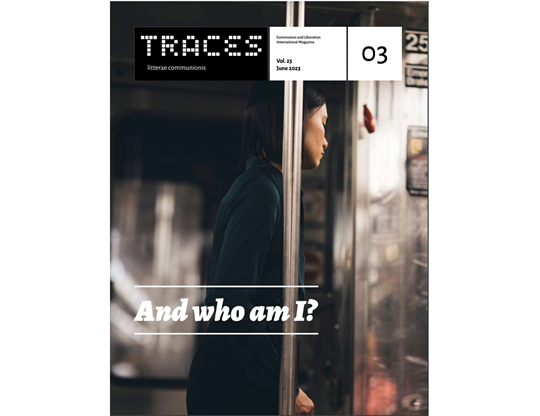
Traces, no. 3, June 2023
The markJust a few syllables. “And who am I?” Leopardi’s brief and boundless verse voices one of the fundamental questions of human life, in which Fr. Giussani identifies the “heart” of the human person, the ultimate, structural material of which we are made. It is not an emotion or a sentiment, but a “fact,” the most “powerful and ineradicable” fact about human life. Fr. Giussani named it and devoted to it an existential itinerary, The Religious Sense, which is the key to his proposal. In fact, he was deeply persuaded that to be free it is necessary to use the heart, “to come down and grasp our own original needs and ‘evidences,’” even though doing this work is “not popular especially when one comes face to face with oneself.” It is also necessary to use the heart to be open to recognizing the answer to those questions, which “are hidden or buried, that are perhaps almost dying but that nevertheless exist,” as Jorge Mario Bergoglio said in his 1998 presentation on The Religious Sense. His talk, which you will find on the CL website, forms the preface to the new edition of the book that will be used in the coming weeks with the resumption of the School of Community, the educational journey of the Movement.
“Today the primary question we must face is not so much the problem of God–the existence, the knowledge of God–but the problem of the human, of human knowledge and finding in humans themselves the mark that God has made, so as to be able to meet with Him.” Bergoglio stressed how more than ever, there is a need today to ask ourselves the “real questions about human meaning, of our existence” in front of “this tranquility offered at a low cost by the supermarket culture.” In this effort we have an unfailing ally: reality. The “heart” awakens in its impact with reality. We have seen this in the recent floods in the Romagna region of Italy, with all the drama they have brought and the gratuitous generosity of people’s responses. Testimonies posted on clonline.org describe the emergency and above all the need for an education, a living companionship, so that we do not lose the openness of the gaze that we have in certain moments when we truly see, when the depth of our need is awakened, in which all the power of humanity that emerges from the mud, mixed with pain, mercy, and goodness, is the beginning of a road of undertanding of who we are, what remains standing, what life is, and the indelible “mark” that is present under tons of debris. “Who cries out in me? What voice in me cries out in this need for true life?”, asked the Spanish theologian Javier Prades in his dialogue on The Religious Sense in Milan. What journey makes it possible to live, breaking through the appearances of things, both an extreme situation and your daily subway commute? The question is open, the answer to be discovered.